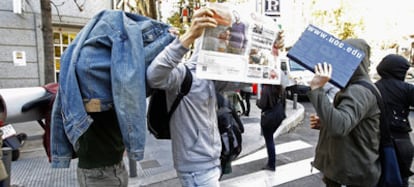Judges slam arrests of protesters
Sudden detention of 15-M members in Barcelona "abuse of power," court says
The regional Catalan police, known as Mossos d'Esquadra, were severely reprimanded by Spain's top judicial bodies for the way they stormed unexpectedly into a Barcelona court cafeteria last Thursday to arrest a group of protesters who had already turned themselves in.
First it was the Catalonia Superior Court of Justice (TSJC), which on Monday issued a public condemnation of an incident that could create an institutional rift between the region's justice system and its law enforcement agency. The ruling called the police intervention against members of the May 15 Movement "manifestly disproportionate" and a "clear abuse of power."
Then, on Tuesday, it was the General Council of the Judiciary (CGPJ), the national oversight body, which described the police raid as an act of "disrespect for the rights" of the detainees.
The six Barcelona youths had voluntarily walked into the courthouse at Barcelona's City of Justice building to provide their names and addresses and express their willingness to appear before Spain's High Court to explain their participation in the June 15 street disturbances, when a group of protesters encircled the regional assembly and harassed deputies as they walked in. Regional premier Artur Mas was flown in by helicopter to avoid the same treatment.
Demonstrators were protesting spending cuts in a region whose leaders have announced drastic savings measures affecting hospitals and retirement homes, among other social services. The arrested youths are being charged with crimes against state institutions, punishable with jail sentences of between three and five years.
Thursday's surprise raid took place without authorization from the chief judge of Barcelona. It was a high-profile affair involving around 50 anti-riot police who stormed into the compound's cafeteria to arrest half a dozen youths who were "awaiting a judicial decision on their situation," reads the TSJC's condemnation. In these circumstances, the arrests were "absolutely unnecessary," the judges' panel concluded.
"The behavior of the officials in charge of this indescribable operation can only be considered in the light of an absolute disrespect for individual citizen rights and contempt for the respect owed by the courts of justice as guarantors of these rights; the extreme gravity of these actions requires accountability," the TSJC said.
On Tuesday, four other people who participated in the June protests imitated these six by voluntarily turning themselves in to the High Court in Madrid, which is in charge of the case. They were not arrested.
The director general of the regional police, Manel Prat, admitted to a "lack of coordination" between all the agencies involved in the incident. But Catalan interior chief, Felip Puig, defended the Mossos, saying they were acting under orders from the High Court.
The TSJC resolution was adopted after examining reports by the chief judge in Barcelona, Maria Josep Feliu, and by the duty judge Josep Maria Miquel Porras. According to these reports, nine 15-M movement members arrived at the Barcelona court at 11am. The duty judge informed the High Court of their presence, and asked how he should proceed, but he did not find the examining magistrate, Eloy Velasco. Instead, Velasco was located by the Mossos, who requested authorization to act against the youths. Velasco told them to proceed "as you have until now." And the Mossos, who had already arrested protesters over the events of June 15, assumed this meant they were to keep making more arrests.

Tu suscripción se está usando en otro dispositivo
¿Quieres añadir otro usuario a tu suscripción?
Si continúas leyendo en este dispositivo, no se podrá leer en el otro.
FlechaTu suscripción se está usando en otro dispositivo y solo puedes acceder a EL PAÍS desde un dispositivo a la vez.
Si quieres compartir tu cuenta, cambia tu suscripción a la modalidad Premium, así podrás añadir otro usuario. Cada uno accederá con su propia cuenta de email, lo que os permitirá personalizar vuestra experiencia en EL PAÍS.
¿Tienes una suscripción de empresa? Accede aquí para contratar más cuentas.
En el caso de no saber quién está usando tu cuenta, te recomendamos cambiar tu contraseña aquí.
Si decides continuar compartiendo tu cuenta, este mensaje se mostrará en tu dispositivo y en el de la otra persona que está usando tu cuenta de forma indefinida, afectando a tu experiencia de lectura. Puedes consultar aquí los términos y condiciones de la suscripción digital.








































